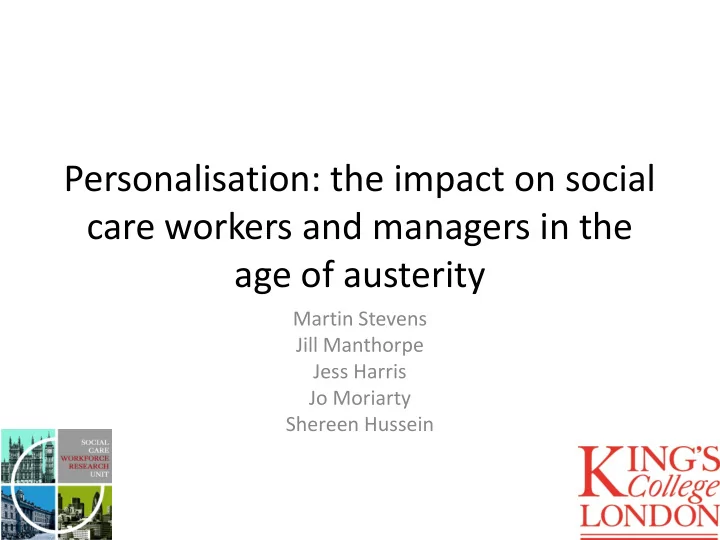

Personalisation: the impact on social care workers and managers in the age of austerity Martin Stevens Jill Manthorpe Jess Harris Jo Moriarty Shereen Hussein
Acknowledgments and disclaimer The research team is grateful for the funding from the Department of Health. And very grateful to all participants in the study. The views expressed in this presentation are those of the authors, not necessarily those of the Department of Health 2
Introduction • Recapping emergence of personalisation • Impact on providers • Longitudinal Care Workforce Study • Findings • Implications
Diverse and contradictory motivations The government has effectively sat its “market-consumer” discourse on the disabled movement’s ‘social rights discourse’ , producing a powerful hybridisation but one riddled with tensions (Scourfield, 2005, p. 473: emphasis added)
Direction of travel Empowerment Ability to able and to choose the citizenship. best services Lymberry (2012).
Social care providers • 17300 organisations providing and organising • 39,000 ‘establishments’ (individual care homes/home care branches) • Half residential, half home care • Two thirds CQC regulated
Marketisation of social care 100% 90% 94% 89% 80% 70% 60% 1979 50% 2012 36% 40% 30% 20% 10% 5% 0% Care Home Home Care Fotaki, Ruane and Leys (2013)
Marketisation of Social Care • UK has gone further than many European countries in privatising social care provision (Daly and Lewis, 2000) • Commercial priorities, at times of austerity can affect quality (Greener, 2015), • Increased demand at a time of reduced public spending makes it harder to provide emotional aspect of care (Lynch, 2007)
Personalisation and social care providers • Early messages from IBSEN: – providers mainly positive about the idea of personalisation – Some were able to offer more flexible services – Fears about invoicing and loss of staff (not found in a later study (Rodrigues et al, 2015) – Hopes that service users would continue to use services, even with greater choice
Contracting • Block contracts to framework agreements • Individualised purchasing • Preferred and approved lists – indication of quality – reduces choice? Boyle, 2013
The Longitudinal Care Workforce Study • Aims to increase understanding of the factors that facilitate or constrain recruitment and retention in the social care workforce in England • Methods at two time points (Time 3 is underway) – 300 interviews care home and home care managers (n=112) and staff (n=117) and service users (n=71) – Online survey of social care staff – Time 1 = 2009-2011; Time 2 = 2010-2014 • Presentation draws on interviews with care home and home care managers and staff • Data coded at ‘personalisation’ node recoded for this presentation
Findings • Four themes: – Awareness of personalisation and understanding its potential impact – Adapting services – Contracting – Impact on the business.
Awareness of personalisation and understanding its potential impact • Increasing understanding of importance of personalisation • Care homes – Personalisation = Person-centred – ‘We are trying to personalise it as much as possible within the four walls’. Care Home Manager 9 2009 T1 • Home care – Personalisation = flexibility – I don’t think there will be many places would be able to say, well, actually we take washing away to wash for individuals. It’s about personalising it. Home Care Manager 76 2009 T1
Adapting services • Care Homes for people with learning disabilities: Moves to supported living? – we’re used to a residential regime and now obviously we’re adapting to working with [Support worker agency supervisor] and the team Care home manager 171 2011 T2 • Home Care: micro changes in provision – No, not really. I mean, erm, care is sort of allocated in regards to the amount of time they have got. From social services it’s task orientated: Home Care Manager 78 2012 T2 • Day services and centres: changing patterns of provision to ‘follow the market’. Concerns about continued availability of specialist services
Contracting • Block contracts to Individualised purchasing – More uncertainty: ‘But that left us in a position that we could have been wiped out in a day’. Home Care Manager 75 2009 T1 – Creates drive for increased competition: ‘What we’ve found now is because the block contracts have ended, a lot of clients can choose where they go, so they’re asking to come to us because they weren’t happy where they were, which is good. ‘ Home Care Manager 172 2011 T2
Impact on business viability • Cuts to hourly rates – …you’re negotiating on price all the time and we don’t make any money as it is, so it’s like the volume of hours and sort of they’re just trying to knock you down. Home Care Manager 172 2011 T2 • More marketing required – The last resort now is a sandwich board down town Care Home Manager 118 2011 T2 • Changes in local placement policy – It's all down to [local authority’s] contracts, for whatever reason, they're not referring anybody anywhere. So it's a struggle, it's a struggle. And I expect if we don't pick up, there's possibilities of closure. Care Home Manager 118 2011 T2
Discussion and conclusion • Personal budgets has more impact on social care providers than direct payments • Personalisation equated with being more person-centred and flexible care • Hard to distinguish impact of personalisation from austerity, though the two are linked • Changes in contracting and increased uncertainty potentially limits the market and choice
Thanks for listening Research team: Martin Stevens martin.stevens@kcl.ac.uk Jill Manthorpe gillian.manthorpe@kcl.ac.uk Jess Harris: jess.harris@kcl.ac.uk Jo Moriarty: jo.moriarty@kcl.ac.uk Shereen Hussein: shereen.hussein@kcl.ac.uk The Longitudinal Care Workforce Study: http://www.kcl.ac.uk/sspp/policy- institute/scwru/res/capacity/locs.aspx
Recommend
More recommend